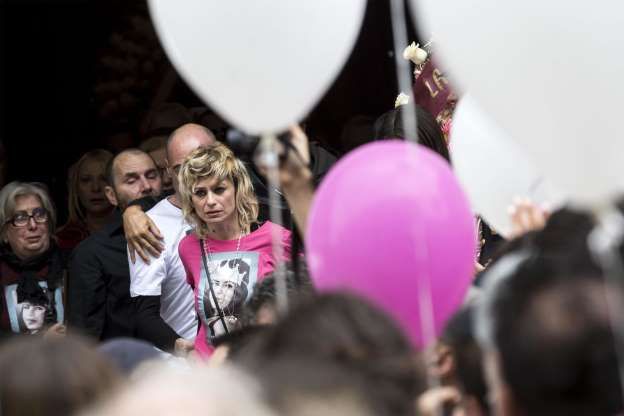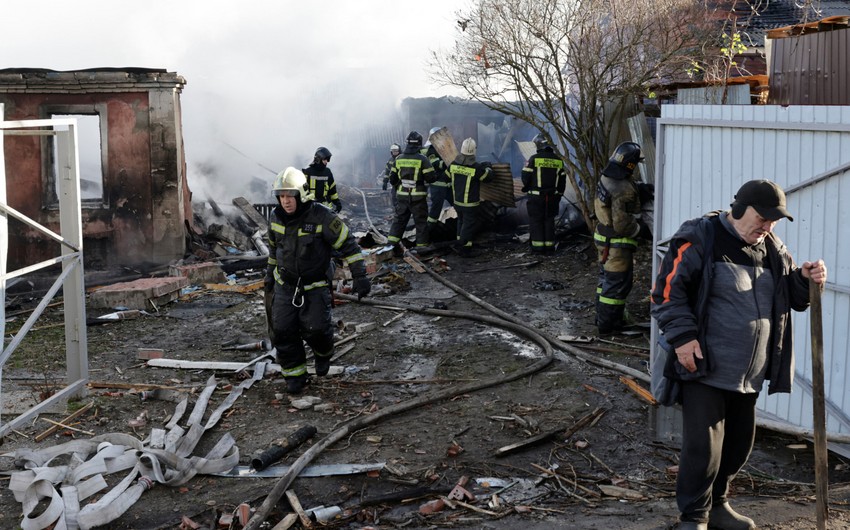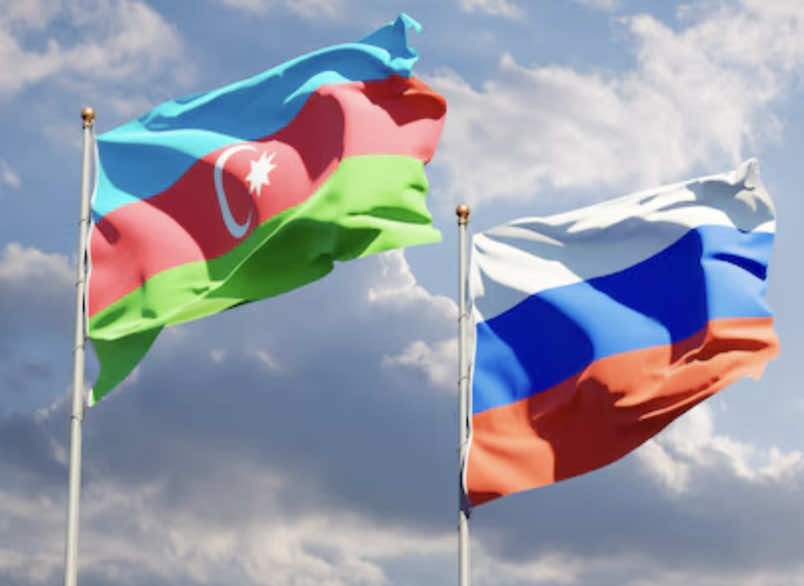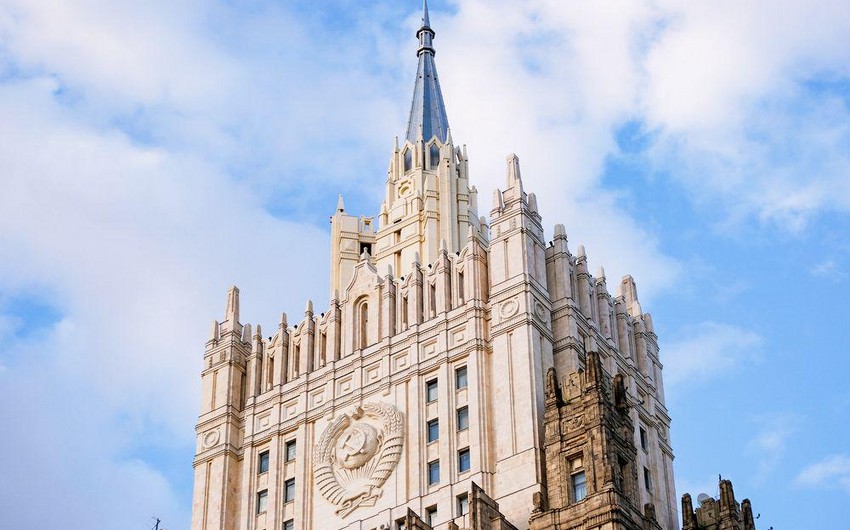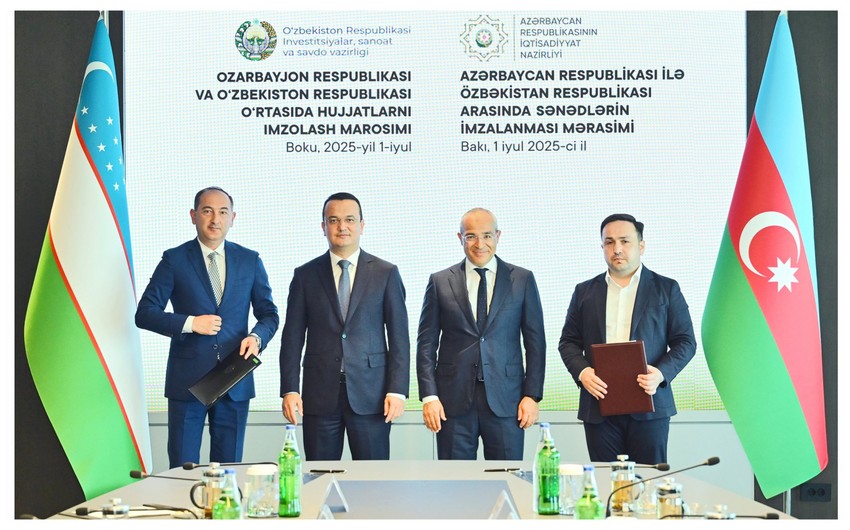At the end of his shooting rampage as the police closed in, Luca Traini climbed the steps of a Fascist-era monument, wrapped himself in an Italian flag and straightened his arm in a Fascist salute.
He had shot and wounded six African migrants — from Ghana, Mali and Nigeria — in this medieval city near the Adriatic Sea to avenge the dismemberment of a young Italian woman, allegedly by a Nigerian drug dealer. In his mind, he was a patriot.
But to Italian leaders, liberals and anti-fascist groups, Mr. Traini was a terrifying omen.
National elections were weeks away and the Feb. 3 shootings came during a hate-laced campaign marred by anti-migrant language, rising intolerance and hints of a Fascist revival.
At the height of the migrant crisis, Italy had been a progressive bastion and a staunch supporter of European unity. But now, the national mood had hardened. Mr. Traini’s rage crystallized, in grotesque form, the growing backlash against migrants and the rise of right-wing politics.
The March 4 elections swept in a new populist government which is deeply skeptical of the European Union and has already slammed the door to new migrants while threatening to expel the ones already in the country. To some in Brussels, Italy is now Europe’s greatest existential threat.
“Within one year, we will see if united Europe still exists,” Matteo Salvini, the country’s new interior minister, said recently.
Mr. Salvini is now Italy’s most turbulent and powerful force. More than anyone, he understood and harnessed the rage unleashed in Macerata.
Often scoffed at for its wobbly governments and disregarded as a mere pleasuredome, Italy has long been Europe’s laboratory for political change. The birthplace of Fascism, Italy gave the world Mussolini, flirted seriously with communism, and, in electing Silvio Berlusconi, provided a playbook for billionaires seeking power the world over.
Now, as liberal democracies across Europe are under strain, new threads of populism are transforming Italy’s politics, and fast. Mr. Salvini’s nationalist party, the League, has increased its support in Macerata from 0.6 percent in 2013 to 21 percent in March.
Macerata was not always that way.
It had a reputation for tolerance and, in 2013, won national recognition for its integration efforts. The former bishop once boasted about the “welcoming spirit” encoded “in the DNA of the city.”
Humanitarian groups such as the Catholic charity Caritas set up in the city to work with migrants. Inside the Caritas reception center, Ibrahim Diallo, 18, from Senegal, spent a recent afternoon practicing conjugation of the verb “to be” with a young Italian woman, Luigina.
“Io sono Ibrahim; tu sei Luigina,” he said. “Noi siamo a Macerata.”
But that version of Macerata seemed more in the past tense.
Macerata’s new bishop, handpicked by Pope Francis, observed recently that “all the tensions rising in the country are now visible in this city.”
In the university, founded in 1290, left-wing students warned that a group of hard-right students in the humanities department were espousing the works of Julius Evola, the spiritual and intellectual godfather of Italian Fascists and Italy’s post-Fascist terrorists.
They said students were attempting to form chapters for hard-right groups such as CasaPound, which is doing better in municipal elections around the country, and Forza Nuova, which in October attempted to re-enact Mussolini’s 1922 March on Rome.
Martina Borra, a local leader of Forza Nuova, is a friend of Mr. Traini, who has been charged with racially motivated attempted murder. He has admitted to the shootings but claimed temporary insanity and is currently on trial. Ms. Borra said he had many local supporters.
“If you ask most people about Luca Traini, they will tell you, ‘He did well, but he should have killed them.’” She added that Italy owed him a debt of gratitude for “having revealed a problem” — and she seemed unbothered that none of the victims were thought to be drug dealers.
On a drive outside the city, she indicated a housing project that she said had become a hub for drug dealers. Police helicopters whirled overhead as she pointed out a small house where women used to buy eggs and where addicts now bought drugs — the police had found human remains nearby.
For her and for others who share her extremist views, this was proof of the migrants’ noxious influence on her country and her city.
On the road back to Macerata and the Fascist-era monument where Mr. Traini had been arrested, she responded to a question about what she was doing for the national holiday the following day, marking Italy’s liberation from Fascism.
“It’s not a holiday for us,” she said.
Lost Generations
Like many Italian cities, Macerata suffered in the aftershocks of the 2008 financial crisis. A devastating 2016 earthquake brought another setback. But city leaders hoped this year would be a turning point.
Romano Carancini, the city’s affable mayor from the center-left Democratic Party, spent the winter preparing a dossier called “Friendly Macerata” as part of a campaign to become Italy’s 2020 capital of culture. It was a designation that would make the city a major tourist destination.
There was much to include.
A college town of 42,000, it offered opera at the outdoor Sferisterio theater and baroque luxury at the indoor Lauro Rossi Theater. Its Palazzo Buonaccorsi had frescoed ceilings, Futurist masterpieces and a world-class collection of horse-drawn carriages.
At certain hours, children craned their necks up at the astronomical clock tower in the main square to see sculptures of the three magi emerging on a carousel. Giuseppe Garibaldi, Italy’s founding father, had represented Macerata in Rome.
But it was the area’s tranquillity that attracted Pamela Mastropietro, an 18-year-old from a working-class section of Rome. As a young teenager, she had started dating a Romanian drug dealer and gotten hooked on drugs.
Her mother, a hairdresser, finally persuaded her to enroll in a drug-treatment center overlooking vineyards in the hills near Macerata. She stayed for several weeks.
But on Jan. 29, as Macerata was named a finalist in the capital of culture contest, Ms. Mastropietro left the rehab center to buy drugs at Diaz Gardens, a park outside Macerata’s city walls.
The winding park had become a warren for drug dealers, many of them migrants. Those demanding the expulsion of migrants pointed to the conditions of Diaz Gardens as part of their case. Mr. Carancini, the mayor, worried they had a point.
In his airy office, the mayor said he had little power to address crime because the Interior Ministry has jurisdiction over the police. Law enforcement was scant in many towns across Italy, including Macerata, handing a powerful talking point to Mr. Salvini who promised zero tolerance for crime when he took charge.
At the gardens, Ms. Mastropietro is believed to have been led to a 29-year-old Nigerian named Innocent Oseghale who had arrived in Italy on Aug. 26, 2014, around the height of the migrant landings. He had dropped out of his asylum program and turned to crime.
Soon after Ms. Mastropietro’s dismembered body was discovered, the police found her bloody clothes inside Mr. Oseghale’s apartment. Italian prosecutors charged him in June with murder, drug dealing and the desecration of a body.
The circumstances surrounding Ms. Mastropietro’s death are still unknown.
Her mutilation horrified the country and immediately became an issue in the national elections. On the campaign trail, Mr. Salvini had already depicted a world in which migrant drug dealers preyed on wayward teenagers in an increasingly drug-addled country. Now, he pounced.
“What was this worm still doing in Italy? He wasn’t fleeing a war. H e brought the war to Italy,” Mr. Salvini said in a statement posted on Facebook after Mr. Oseghale’s arrest. “The left has its hands dirty with blood. Another state killing. Expulsions, expulsions, monitoring and still expulsions!”
Many Italians were already worried that their young belonged to a lost generation. Police reports of drug use, especially among the young, increased 40 percent in the last two years, according to a report presented in June in the Italian Senate.
Heroin and cocaine are making comebacks. And despite some improvements, youth unemployment still hovered above 30 percent, among the worst in Europe.
Frustrated young voters had fueled the rise of the Five Star Movement, Mr. Salvini’s anti-establishment coalition partner. The party remained purposely vague during the campaign to attract votes on the left and right, but Mr. Salvini did the opposite.
He accused undocumented migrants of taking jobs from young Italians and advocated extreme measures, including “a mass cleansing, street by street, neighborhood by neighborhood.”
In Macerata, Mr. Traini, who once described Mr. Salvini as his “captain,” held a similar view.
A chubby kid who grew up to be a weight lifter with the word “outcast” tattooed across his knuckles, Mr. Traini at first seemed like so many other members of Italy’s wayward youth. He was failing to find steady work and living at the age of 28 with his mother and grandmother.
But signs of Mr. Traini’s extremism were scattered around his room. He kept a copy of “Mein Kampf”; a black flag with a Celtic cross, used by the European neo-Nazi movement; and the cover of “Fascist Youth,” a magazine published during the rule of Mussolini.
After winning zero votes as the League’s candidate for local office in Corridonia, the town where Ms. Mastropietro had entered a drug clinic, he drifted further right, toward Forza Nuova.
Ms. Borra, the Forza Nuova activist, said that Mr. Traini’s nickname was “the wolf” but that he was a bit more like a “stray dog.” Having started in the League, she said, “he got close to CasaPound, all of the movements on the right.”
On the morning of Feb. 3, Mr. Traini went to the gym, heard a news report about Ms. Mastropietro on the radio and, according to his lawyer, went insane with a desire to kill drug dealers. He returned to his mother’s house and retrieved his Glock handgun. Armed with two cartridges and 50 bullets, he took off in his Alfa Romeo 147, music blasting.
“Maybe it was the Flight of the Valkyries,” joked Giancarlo Giulianelli, Mr. Traini’s lawyer.
Outside Diaz Gardens and below a statue of Garibaldi, Mr. Traini shot at men sitting inside the glass gazebo of a bar. He fired into the local headquarters of the Democratic Party and rode out to the country road where the police had found Ms. Mastropietro’s remains.
Mourners had left flowers and candles wrapped in rosaries. Mr. Traini said a prayer over a candle with a sticker of Mussolini on it, his lawyer said.
As he returned to town, he stopped in front of a pub called H7, where he had worked until October when he was fired as a bouncer for insulting the clients at a techno concert. He fired three shots, sending Roberto Tartabini, the manager, scurrying into an adjacent room.
“It was a personal vendetta,” Mr. Tartabini said, adding that he intended to turn the bullet holes in the door into a smiley face to promote tolerance.
All six of Mr. Traini’s victims were black. Omagbon Festus, 33, was walking to the grocery store when Mr. Traini pulled up next to him. Mr. Festus said he saw “a pure white Italian man” pointing a pistol before he felt the bullet that shattered the bone in his left forearm.
In the hours after the shooting rampage, the news media and much of Italy’s political leadership descended on Macerata. Mr. Salvini offered a perfunctory condemnation of the violence on Twitter, but he also argued that “unchecked immigration brings chaos, anger” and “drug dealing, thefts, rapes and violence.”
Mr. Carancini, the mayor, scrambled to respond, and to his critics, seemed overwhelmed. But he said that the damage had already been done — to the image that the Democratic Party was effectively managing the migration crisis, to the party’s electoral prospects, and to Macerata’s chances of becoming a major tourist attraction.
Two days after the shootings, Mr. Carancini traveled to Rome to make his best pitch to the Culture Ministry.
“Macerata, in that moment, almost required it,” the mayor said bitterly. “We were in a centrifuge.”
The commission selected Parma, a town in northern Italy already famous for prosciutto and cheese, as the 2020 capital of culture.
The Rise of the League
Only a few years ago, Mr. Salvini, the interior minister, seemed like an old blemish on Italy’s fresh new skin.
He led the Northern League, a regional separatist party seemingly out of step with the national mood. Public opinion was rallying around asylum seekers after Pope Francis visited migrants on the island of Lampedusa in 2013.
The Italian government adopted a humanitarian policy to rescue migrants at sea, while the country’s center-left prime minister, Matteo Renzi, promised to lead Italy into what he saw as modernity.
But roughly 620,000 migrants, many of them Africans, have arrived in Italy since the migration crisis began in 2014. They resided in government centers and local parishes, but many also loitered at train stations or outside supermarkets and bars.
And some have inflated the ranks of the dangerous Nigerian mafia that traffics in drugs, prostitution and sex slavery.
Mr. Salvini turned out to be a talented politician with a gift for communicating just the earthy authenticity that the more domineering Mr. Renzi often lacked. He perceived the growing frustration as Brussels refused to help Italy share the migrant load, and he was willing to exploit it by advocating withdrawal from the euro currency and by drawing nearer to right-wing leaders in Austria, Hungary and Poland.
By 2016, Mr. Salvini was on the rise.
He walked through a market in Milan, receiving the warm regards of Italian fruit vendors and pointing disapprovingly at the foreigners selling cloves of garlic. He stopped into a bar and talked about whether he wanted to leave the euro (“Definitely yes, tomorrow morning”) or whether Russia had paid for his support (“It’s geopolitical and free”).
Several times, people interrupted to encourage him. “Do what you say you’ll do,” one woman said.
“I can’t wait,” he responded.
He transformed his Northern League party from a regional separatist movement into a national — and nationalist — movement. He had once disparaged southern Italians as lazy and reeking; now he courted their votes by dropping “Northern” from the party’s name.
Cribbing from an international populist playbook, he railed against the elite and against the mainstream media, even as he dominated its news cycles. With southerners welcomed to the fold, he needed a common, external enemy for Italians to rally around.
He had once disparaged evil bureaucrats in Rome. N ow he turned his ire on Brussels. The southern threat became invading African migrants.
To get his message out, Mr. Salvini mastered Facebook, as did his alliance partners in the Five Star Movement. Together they dominated social media and spread anti-migrant sentiment, even as the number of arrivals began to drop steeply under the Democratic Party’s new government policies.
Last winter, as the campaign entered its full swing, Mr. Salvini posted a video to his Facebook account contrasting poor, elderly Italians digging through the garbage for food with African migrants criticizing Italian rice.
“On the TV news they don’t show this, I wonder why … At least SHARE it on the web,” Mr. Salvini wrote. The post was shared 294,000 times with 10 million views.
By then, Mr. Salvini’s appeal was spreading to places like Macerata.
On a recent evening, Tullio Patassini, a League member who now represents Macerata in Parliament, explained why the party fit so well, touching on topics such as law and order and the Russian sanctions. He said that Macerata, a traditional center of the Italian shoe industry, opposed sanctions against Russia because “the Russians love Italian shoes and we lost the market.”
Mr. Salvini openly admires President Vladimir V. Putin of Russia and his populist government has already opposed the European Union sanctions. But the decisive issue seemed to be migration.
Mr. Patassini said frustration over illegal migration had really turned up the temperature.
“It’s like a pot that boils, boils, boils until the top shoots off,” he said. “Because we Italians are a welcoming people, generous, good, available — and so the case of Pamela posed a problem for everyone. It’s an Italy problem.”
‘No, No, No’ to Migrants
Weeks later, Mr. Patassini attended a funeral in Rome for Ms. Mastropietro, now known throughout Italy simply as Pamela. “How could I not be here?” he said.
At the onset of the migration crisis, towns and politicians in Sicily sometimes held funerals for unknown migrants who had drowned at sea in a sign of solidarity and respect. But at Ms. Mastropietro’s funeral, parishioners in the back of the church whispered “No, no, no” when a delegation of Nigerian officials came to pay their respects.
Ms. Mastropietro’s portrait and candles sat atop her white coffin. Mr. Carancini, the mayor, sat in the front row and listened as Ms. Mastropietro’s mother gave an anguished speech.
“Even if they harmed you atrociously,” she said in a trembling voice, “you are alive despite those people who massacred you.”
Ms. Mastropietro was due to return from the drug treatment center on March 4, the day of the election that swept Mr. Salvini into power. It was also the day that Mr. Festus, one of the migrants shot by Mr. Traini, turned 33.
He lives about 45 minutes outside Macerata in a sparsely furnished room a short walk from a soccer field that was an internment camp for 61 Jews in World War II. The first time he saw Macerata, he said, he was struck by how clean it was. He shopped for red palm oil and talked to friends in the African shops. Now he avoids it.
“I crossed the Sahara and the Mediterranean,” he said. “And this happened to me in Europe?”
Europe’s history is bloody and the idea of it as a haven is relatively new. But people forget.
On April 25, the Italian holiday commemorating the end of Nazi occupation, a handful of army veterans saluted the fallen soldier at Macerata’s crater-shaped Monument of the Resistance. Mr. Carancini, wearing a tricolor sash, urged the crowd not to forget Italy’s Fascist past.
“This territory in particular is living a moment of great difficulty, uncertainty and precariousness,” he said.
The ceremony ended, the crowd broke up, and some wandered past newsstands selling local papers headlined “Pamela: Torture and Crime, The Secrets of the Nigerians.” At Piazza Vittorio Veneto, volunteers offered lunch for 200 residents and migrants. A priest handed out prayer cards quoting Pope Francis: “We are all migrants.”
Mr. Diallo, the Senegalese man who had practiced his Italian verbs at the Caritas center, laughed with friends as they ate African and Italian specialties. Tiziana Manuale, who managed the center, sat nearby. Many people at the lunch would be forced to leave, she said.
“There was the notion that Macerata is a welcoming city,” she said. “But some parts of the population aren’t ready.”

